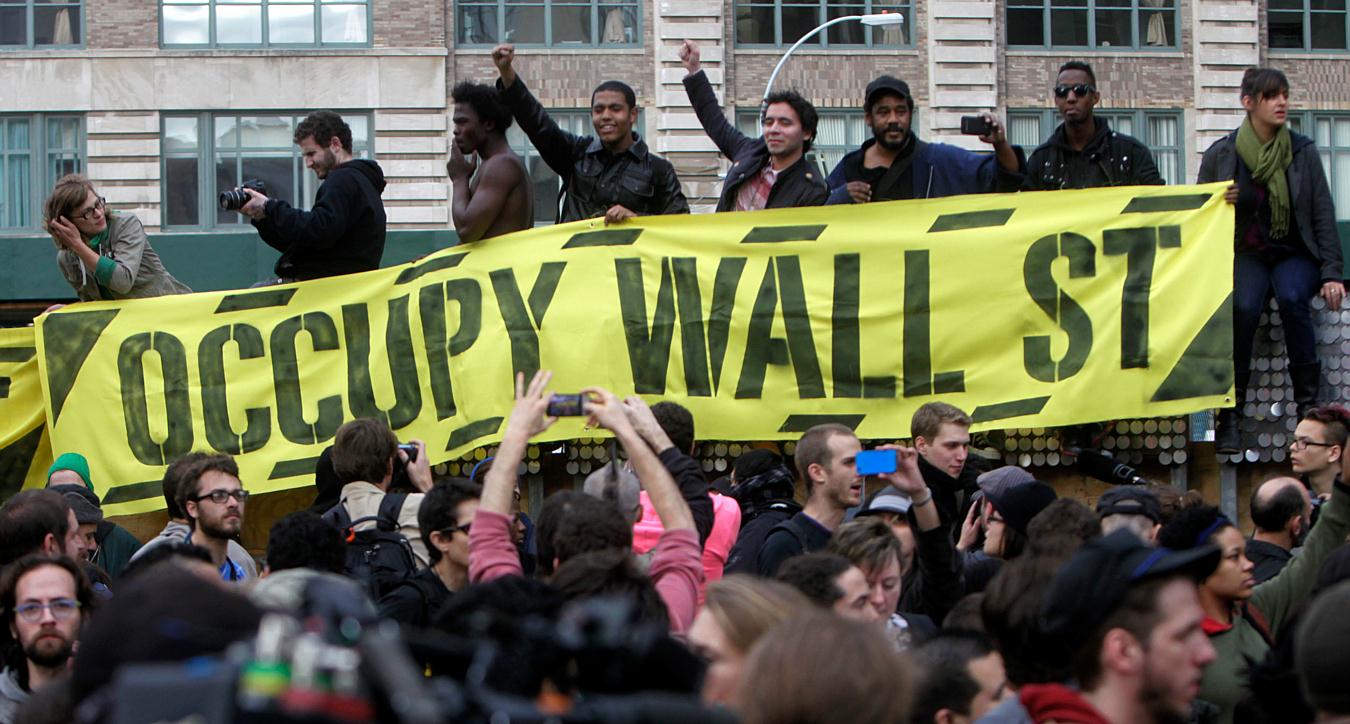 Today, after two months of occupations and the attacks on the occupations in Portland, Oakland and now Manhattan, OWS might be crossing a new threshold–a massive convergence of students in Union Square and a working-class convergence in Foley Square attempting to give reality to the growing calls for a general strike. That new threshold should include the extension of the occupations to buildings for the coming winter and, beyond that, to workplaces, where the working class can make the system stop, as a further step toward taking over the administration of society on an entirely new basis. Whatever happens today (November 17th) and in the coming week of action, it is time to assess the strengths and limits of the occupation movement both in New York and around the U.S.
Today, after two months of occupations and the attacks on the occupations in Portland, Oakland and now Manhattan, OWS might be crossing a new threshold–a massive convergence of students in Union Square and a working-class convergence in Foley Square attempting to give reality to the growing calls for a general strike. That new threshold should include the extension of the occupations to buildings for the coming winter and, beyond that, to workplaces, where the working class can make the system stop, as a further step toward taking over the administration of society on an entirely new basis. Whatever happens today (November 17th) and in the coming week of action, it is time to assess the strengths and limits of the occupation movement both in New York and around the U.S.
There is no question that this is the most important movement to hit the streets in the US in four decades. Its wildfire spread to 1,000 cities in a few weeks attests to that. The avalanche of “demands” has suddenly made the social and economic misery of 40 years, largely suffered passively, with occasional outbursts of resistance, a public reality impossible to ignore from now on. Politicians, TV personalities and various experts have been caught flat-footed before a movement that refuses to enter their suddenly irrelevant universe. For all the “grab-bag” quality of what it has said, the movement has been absolutely right to refuse to identify too closely with specific demands, ideologies and leaders. Daily social reality over years has educated it all too well for it to fall into that game. Underneath everything is the reality of what the movement represents: the refusal of a society that places ever-greater numbers of people on the scrapheap. To identify itself too closely with any laundry list of demands would be to fall beneath the movement’s deeply felt sense that everything must change and the certainty that nothing should be as before.
In response, the largest forces with a potential to derail this movement into respectable channels (the Democratic Party and the union officials) are scrambling to control, defuse and repress it, as they did successfully, for example, in Wisconsin in the spring. They are not having an easy time of it.

The realities of occupations in 1,000 cities defy easy generalization. The news media has attempted to portray the core of the movement as young, white, unemployed and “middle class”–the latter tag being a fast-disappearing mistaken identity for the working class. Whatever the case in the early stages, in different cities (most notably in the November 2nd mass march on the Port of Oakland), significant numbers of blacks and Latinos, as well as older people, have expanded the movement in many places beyond the initial core.

Our purpose here is not to dwell on the thousand slogans, something that is to be expected from a very young movement made up to a great extent by people for whom this is the first such experience of their lives. Ideas such as the “1%” or “make the rich pay their fair share” or “make the banks pay” or “abolish the Fed” sit side by side with attacks on “capitalism”. We would suggest that the excessive focus on the “banks” does not recognize that the source of widespread misery is the world crisis of the capitalist (wage labor) system and, as a result, it does not point to the overcoming of the crisis by establishing a world beyond wage labor, namely socialism or communism (although we are well aware of the abuse of those words in far too many cases). To arrive at such a focus requires speaking openly of class. It is clear that the large majority of working-class people in the U.S., while sympathetic to the movement, have not joined it in any active way, if only because they are working and caught up in daily survival.
The occupation movement needs to build on the creative militancy in the streets of thousands of people (as shown in Oakland, Portland, Seattle, New York and elsewhere) to reach out to that large majority which sometimes seems, a block or two from the street battles, to be going about business as usual. The growing number of anti-eviction and anti-foreclosure actions has made that outreach. Taking over buildings for meetings and much-needed living space, as well as for workshops and teach-ins, could be an important next step. Beyond that should be the extension of the movement to work stoppages and occupation of workplaces, posing even more sharply than before the questions of private property and of “who rules”?
The pending contract renewal of Local 100 of the Transit Workers Union is one obvious link here in New York. The ongoing standoff between west coast dock workers (ILWU) Local 21 and the scab-herding EGT Corporation in Longview, Washington, is another. The planned occupation, together with parents and students, of five public schools slated for closure in Oakland, is still another. In such efforts, we believe that the movement will have little difficulty distinguishing between the rank-and-file workers (who have already joined it on occasions) and the trade-union bureaucrats who have passed one toothless resolution after another of “support” without the slightest, or only token, mobilization.
Still less needs to be said about the Democratic Party politicians–most notoriously, Oakland Mayor Jean Quan–who have tried to ride the movement for their own ends–before sending in the riot police.
However, occupation is only a further step: beyond it is the question of taking over the production of society for ourselves and running it on an entirely new basis.
Whatever happens in the immediate future, a wall of silence on the accumulated misery of four decades has been breached. Every day brings further news of attacks on working people as world capitalism spins out of control. Never has it been clearer that capitalist “normalcy” depends on the passivity of those it crushes to save itself, and from Tunisia and Egypt, via Greece and Spain, to New York, Oakland, Seattle and Portland, that passivity is over. The task today is to throw everything we have into approaching that point of no return where conditions cry out: “We have the chance to change the world, let’s take it.”
Comments
Educated father to 11 children…4 are biological from a previous marriage, and seven are adopted children that my wife had when I married her. I lost my home, my career, and my first marriage due to the economic pressures applied to the building industry in 2007/2008. Forced from that position, I opted to go back to college, only to be demonized buy social services for ignoring my responsibilities as a father and selfishly attempting to finish my degree. I’m a disabled vet, and have been employed for my entire adult life, sraping the bottom of the social food chain, in part due to lacking a bachelors degree in a society that demands it as a minimum requirement to get my ticket punched and “progress” in any type of job. So, crushed, and homeless…I returned to school. I was maintaining a good GPA, when I met my current wife. Lori has never been married, in her early 50′s, has a heart of gold, and struggling to pay her mortgage and feed her 7 children, after losing a 35 year, very successful day-care business in Fargo, ND. Having no other experience, Lori returned to college herself, taking a full load of classes, and attempting to live on her meager income provided by the state to assist with her 7 adoptive children. After we met, as a “homeless vet”, Lori took me into her home. We fell in love and married this past summer. Since that time, I quit school to return to work after being out of the workforce since the summer 2010. The only position I could find was a job taking school photos and working phone sales with a local photography studio. I seem to be overqualified for most labor work, and underqualified in a city with 5 colleges and a surplus of unemployed college graduates. At $10 dollars per hour, My new family struggles to eat or even heat our 7 bedroom 4 bath home that Lori had purchased over 20 years earlier to house her adopted children and operate her childcare business from. Now, with that business gone, and Lori going to school, racking up even more debt…I find we are sinking, having to find some way to pay off my own student loans, her mortgage, over $700.00 per month for family medical health insurance, food, electric, car payments…etc., ect… You know the story…so many of you find yourselves in the same or even worse predicament. I so desperately desire to be out in those streets…screaming at the top of my lungs for some kind of justice! My employer is struggling too, so getting 40 hours of work at 10.00 per hour (no health benefits offered) and paying court ordered support (wages garnished at $201.46 every 2 week paycheck) leaves Lori and me feeling totally helpless. I don’t know what else I can do to help my family and children. I’m so pissed off. NO HELP…I feel hopeless and sinking. I’m definitely in that 99%…and Pray for some miracle of change. I want justice…for all of us…just…justice.
I really enjoyed the article and will be sharing it with our local Occupy group (Occupy Santa Barbara). Thank you!
I think it’s worth noting that, among the 99 people arrested for sitting in at the Brooklyn Bridge on November 17th were George Gresham of 1199 and Mary Kay Henry of SEIU, fresh off her endorsement of Obama for re-election as well as two Democratic City Council members–providing somewhat timely evidence of the ways in which the unions and the Democrats can work this game. Meanwhile, needless to say, the marchers went across the walkway rather than the roadway.
JG.
JG
The slogan by Marx , Workers Of All Countries Unite needs to be followed today more than ever.We are living in a class society and that needs to change.The workers from Egypt to the USA needs to take political power into their own hands.Then we can begin to do things for the good of the people.The working class got similar problems no matter where they are in the world.It will be a hard struggle but it will be worth it in the end.At the present time we are living more like animals than humans,the working class can change that.
Trackbacks
6 pings so far.